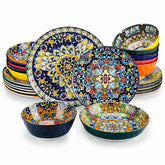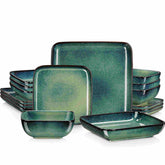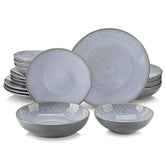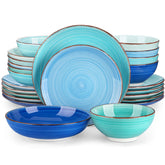Baking Cakes in Stoneware - A Guide to the Best Cake Choices
Navigation
- Cakes That Thrive in Stoneware Pans
- Cakes to Avoid in Stoneware Pans
- Baking the Perfect Stoneware Cake
Stoneware bakeware has become a rising star in many home bakers' kitchens. With its ruggedly handsome looks and reputation for distributing heat evenly, it's easy to see why more bakers are reaching for stoneware over metal pans.
But while stoneware undeniably adds artisanal appeal to your baking, it also comes with some limitations. Its coarse, porous surface and hefty construction make stoneware better suited to some cake types than others.
In this guide, we'll explore the best and worst cake choices for stoneware pans. Learn which cakes will thrive in stoneware, with delicious caramelized edges and firm yet moist texture. We'll also cover which delicate cakes are likely to falter, sticking fast or collapsing in these hearty pans.
Cakes That Thrive in Stoneware Pans
Certain sturdy, resilient cakes flourish when paired with stoneware's rugged charm. Here are the top contenders that handle stoneware's snug embrace and crisp heat beautifully.
Pound Cakes
The dense, finely-crumbed texture of pound cake is right at home in stoneware pans. Pound cakes are sturdy enough to withstand stoneware's tendency to produce craggy edges and a crusty top crust. In fact, stoneware's high heat draws out pound cake's buttery richness and gives the crust a delightful crunch. The neutral flavor of pound cake also doesn't compete with subtle mineral notes from the stoneware. An all-around harmonious match.
Muffins - Bran, Oatmeal, Corn
Heartier muffin batters, like bran, oatmeal, or corn, bake up nicely in stoneware tins. The rough-hewn look of stoneware suits the rustic texture of these homespun muffins. Studier batters are also less likely to stick in stoneware's snug nooks and crannies. Take care not to overmix or overbake, as stoneware and muffins can dry out easily. But when paired thoughtfully, stoneware gives muffins irresistible crags, crevices, and crunch.
Simple Tea Cakes - Matcha, Marble, Lemon
Compact, finely-textured tea cakes thrive in stoneware's steady heat. Subtle flavored cakes like matcha, lemon, or marble avoid competing with stoneware's natural flavor. Sturdy yet moist, tea cakes readily release from stoneware's grip. For marble or streaked batters, stoneware tins give dramatic definition to swirling stripes and patterns. A delightful contrast of texture between crusty exterior and moist interior.
Gingerbread
The robust flavors of gingerbread suit stoneware beautifully. Molasses, warm spices, and brown sugar sing against stoneware's earthy mineral background. Gingerbread batters readily release from stoneware's surface while developing crackly edges brimming with character. As a sturdy quickbread, gingerbread holds up well to stoneware's snug shape without drying or sinking excessively. A match arguably made in heaven.
Cakes to Avoid in Stoneware Pans
Not all cakes rise to the challenge of stoneware quite so easily. Here are a few temperamental cakes that tend to underperform in these rugged pans. Consider alternative bakeware for a happier baking experience.
Delicate Cakes - Sponge, Angel Food, Chiffon
Ethereal foam cakes like angel food and chiffon cakes require gentle treatment that stoneware struggles to provide. Their featherlight, cloud-like crumb suffers in stoneware's grip, becoming crushed or distorted. Whipped eggs can easily overcook, losing stability. Nonstick materials like silicon or ceramic suit delicate cakes far better. Stick to sturdier constructs like pound cake in your stoneware pans.
Citrus or Carrot Cakes
Vibrant citrus or carrot cakes pose two issues for stoneware. First, extracts and juices can seep into stoneware's pores, diluting flavor. Second, the natural moisture of carrots and citrus means these batters bake up exceptionally wet. Extended time in stoneware retains even more humidity. The result? A gummy crumb and muted flavors. Opt for a classic butter cake or neutral pan material instead.
Fancy Layer Cakes
While stoneware can support simple round two-layer cakes, it quickly becomes problematic for more complex constructions. The weight of elaborate tiered cakes can cause stoneware pans to warp or crack under stress. Layers also tend to stick and tear when released from stoneware's grip. Not to mention, fancy motifs don't transfer cleanly onto stoneware's naturally textured surface. Choose sturdier, smoother baking materials for ornate layered creations.
Heavily Decorated Cakes
Speaking of decoration, stoneware does limit your frosting and piping options somewhat. While you can absolutely adorn cakes baked in stoneware with buttercream, fondant, chocolate drizzles and more, avoid intricate piping or sugarcraft. Stoneware's rugged canvas makes a better home for organic adornments like nuts, fruits, or gently peaked frosting rather than precarious roses or scrolls. Rustic charm wins out over fussy precision when it comes to stoneware cake decor.
Baking the Perfect Stoneware Cake
Equipped with this guide, you can now select cakes truly destined for stoneware greatness. Consider how your cake's batter, texture, flavor, and decor will interact with stoneware's sturdy constitution before deciding if it's a match. When paired thoughtfully, your stoneware baked cakes will shine with artisan appeal.
We hope these tips give you the confidence to capitalize on stoneware's strengths and work around its limitations when designing your next bakery masterpiece. So preheat those stoneware pans, grease the edges, and get ready to wow your guests with the joys of baking in stoneware. Rustic, flavorful, and full of charm, your new stoneware creations are sure to be a hit. Happy baking!












